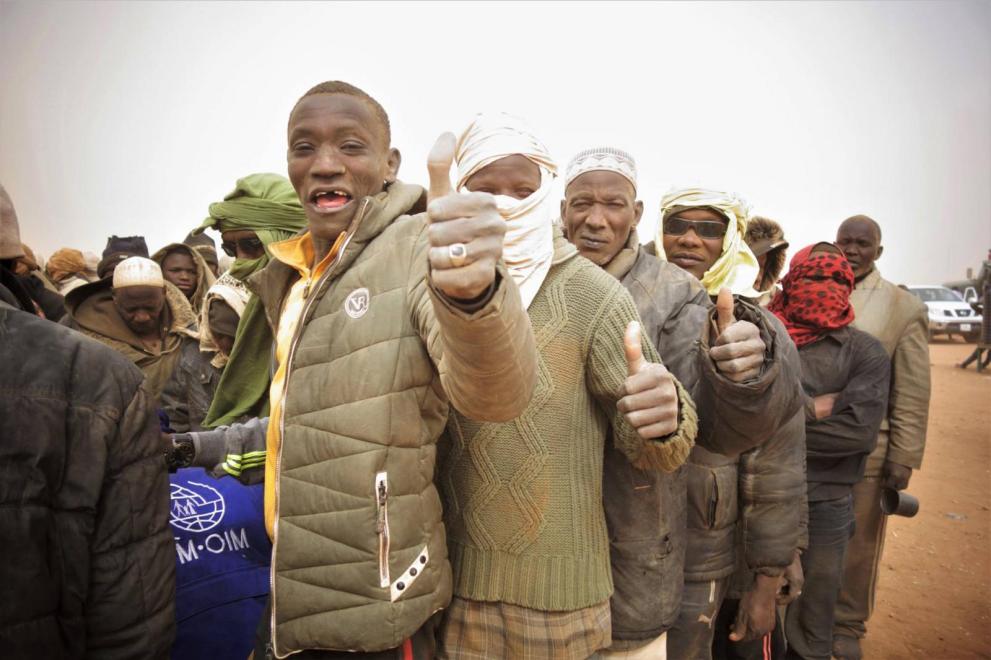
The EU and the UN Migration Agency, the International Organisation for Migration (IOM), launched one year ago a joint initiative for migrant protection and reintegration.
The objective was clear: to respond to the urgent protection needs and unacceptable loss of life of migrants along the Central Mediterranean migration route while addressing the challenges faced by returning migrants and their communities in countries of origin.
Fourteen countries have been involved: Burkina Faso, Cameroon, Chad, Gambia, Ghana, Guinea-Bissau, Guinea, Mali, Mauritania, Niger, Nigeria, Senegal, Côte d'Ivoire and Libya. And so far, nearly 20 000 vulnerable migrants have been assisted through this initiative.
"Libya… not easy to come and not easy to leave", a group of fellow stranded Nigerians warned Debbie, probably too late.
Debbie is one of the 15000 migrants that have been voluntarily returned to their countries thanks to the joint European Union and UN Migration agency's effort launched a year ago to save lives and improve conditions for migrants along the migration routes and for those stranded in Libya.
She dreamt of becoming a fashion designer and a lady from her church told her she could earn more money as a tailor in Libya than in Nigeria. So Debbie paid a smuggler to cross the desert. Many of her companions died along the route. When she finally got to Libya she was arrested at the hospital because she did not have travel documents. She was there to give birth to her twin babies and only one survived.
Through the joint initiative, Debbie was offered a flight home to Nigeria, sewing machines and material to launch her fashion designer dream.
This initiative stems from the EU Emergency Trust Fund for Africa (EUTF), set up at the Valletta summit in November 2015 in order to address the root causes of instability, forced displacement and irregular migration and to contribute to better migration management.
The main driver of the EUTF/IOM joint work is to strengthen mechanisms to protect and assist migrants, making sure that the migration process is safer and better managed and that migrant rights are respected.
Well before the media started to report on the situation in Libya, the European Union engaged with IOM to provide an alternative to migrants stranded in the country.
In a year, more than 20,000 persons have been assisted in Libya at disembarkation points, inside and outside detention centres or in host communities. They have been offered medical assistance and distributed mattresses, blankets and hygiene kits through the joint initiative.
The EU is working hand in hand with the Libyan municipalities supporting their socio-economic development in order to integrate Libyans who have been internally displaced and migrants before they are voluntarily returned to their home countries. The goal is to empty the current population in the detention centres in the next few months in order to close them, while new avenues to come to Europe or other safe places are opened for those who have the right to international protection and cannot go back to their countries.
As the Libyan authorities need to be empowered on their border management, IOM is working by training them on how to be compliant with human rights principles and on how to address the needs of vulnerable migrants. It is not an easy challenge, especially when it comes to access on the ground, but the EU and IOM have been long working towards a solution.
As a result of this partnership, open centres are being established in Mali and Burkina Faso, complementing those already up and running in Niger. In these centres migrants can get food, temporary accommodation, psychosocial assistance, counselling and family tracing.
More than 2600 stranded migrants have also been rescued through search and rescue missions in Niger, as many of them are abandoned in the desert.
The more than 15000 individuals that could safely return to their home country since May 2017 can benefit from reintegration packages, encompassing assistance to migrants, communities of return, and structural environments in countries of origin in order to ensure the sustainability of reintegration.
Returnees may encounter a number of challenges which can impact their ability to readjust to life back home and re-establish themselves in their countries of origin, equally impacting other members of their community. To address these challenges, the joint initiative promotes an inclusive reintegration approach that supports both migrants and their communities, contributes to local development and mitigates some of the drivers of irregular migration.
Awareness raising campaigns about the perils of irregular migration is also part of this joint initiative. In countries of origin and along the routes, thousands of migrants were provided with reliable information, also on the asylum policies or legal pathways possible, offering them with a realistic picture on which to base their future decisions regarding migration and return. As an example, this effort permitted to sensitize more than 53 000 migrants in Niger between April and November 2017, providing them with a realistic picture on which to base their future decisions regarding migration and return.
There is still a lot left to do, but the African Union, European Union and United Nations Task Force is expected to accelerate the work already ongoing. Joining forces with the African Union, the EU and IOM can scale up the efforts and help more people in less time.
More information in the Fact Sheet
Details
- Publication date
- 14 December 2017
- Region and Country
- Regional Sahel and Lake
- Thematic
- Improved migration management
- Partner
- International Organization for Migration
